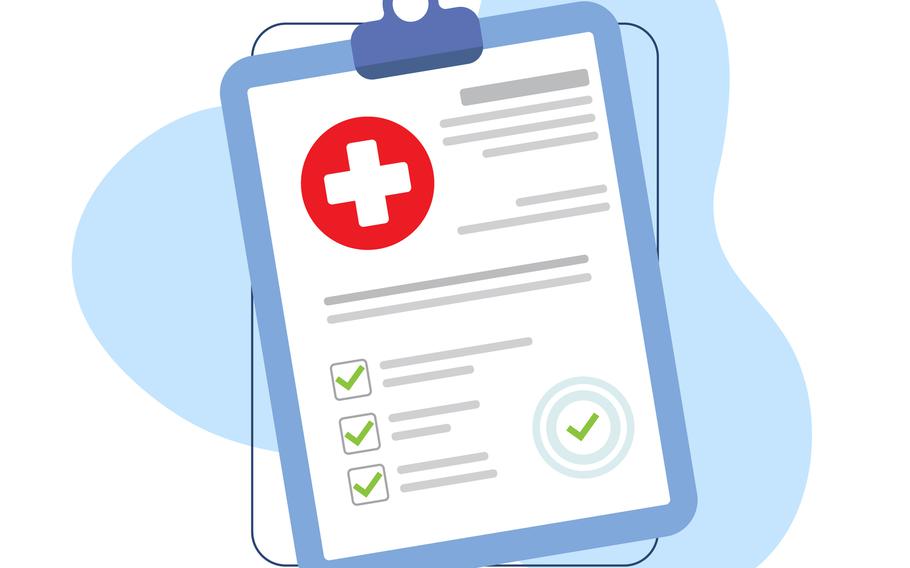
(iStock)
“What can I do for you today?” my new primary care manager said, after tap-tap-tapping on and opening the door of the examining room at the Naval Health Clinic. This was my fourth — or was it the fifth? — new PCM in the past two years. I’d lost count.
I told this civilian doc that I’d made the appointment because my prescriptions were expiring, but also, I was worried about my high blood pressure and cholesterol levels. “One of my last PCMs suggested lifestyle changes, so I’ve lost some weight, and —” I began, but the doc interrupted.
“So, you’d like to get lab work done. Okay, what else can I do for you?” I got the distinct impression she was in a rush, so I quickly mentioned my arthritis and a concern about one prescribed medication. Had I been on it too long?
She handed me a chart document that had been copied so many times, the print was faded and askew, and asked me to track my blood pressure readings at home. She performed a basic exam, listening with her stethoscope and tapping on my stomach, that took no more than a minute and a half.
“You can log in and see your lab results when they come in. If you have concerns, follow up with me. Give me five minutes after you leave to get those prescriptions ordered,” she said, then bid me adieu.
It was the fastest doctor’s appointment I’d ever had in my 32 years as a military spouse.
As a long-time Navy wife and patron of dependent military medicine services, I am accustomed to having to change PCMs often due to military moves and the necessary transfer of medical staff to and from military treatment facilities (MTFs). I liked some PCMs better than others, but had been generally satisfied with the care.
However, since our last PCS in 2013, our family has experienced drastic fluctuations in the quality and accessibility of military healthcare services at our clinic. Our clinic was initially buzzing with staff and patients, but many of the specialty offices soon closed or were limited to active duty only. Several years ago, I was advised by my PCM to start looking for Tricare providers because dependents were being phased out. Later I was told the clinic was trying to get beneficiaries back. Two years ago, I was told that there was only one PCM at our clinic and a two-month wait to get an appointment. Last year, I was assigned a terrific new PCM, but he was gone after only six months. The next two PCMs I met only once and they were gone.
This story is no coincidence.
In 2013, the Defense Health Agency (DHA) was established to address Congress’ concerns about “inefficiencies” (i.e., costs) in military health. The DoD instructed DHA to ensure that MTFs spend most of their resources on wartime readiness and treatment of military service personnel. DHA’s mission was expanded in 2017 to transfer the management and administration of all MTFs worldwide to DHA. The transition was completed in November 2022.
The required emphasis on readiness caused an increase in training and deployment of medical personnel, taking them away from their jobs at 736 MTFs and causing staffing shortages. Uniformed family practice professionals felt underpaid and overworked, and many left the service. DHA shed 200,000 retired and dependent beneficiaries and 12,800 military health billets to cut costs. Beneficiaries were forced out, only to find inadequate Tricare providers.
Eventually, the US Inspector General, watchdogs and the press began openly recognizing the staffing shortages and access to care issues at MTFs, resulting in DoD directives and a Military Health System Strategic Plan for 2024 to 2029 to address the problems. However, the FY 2025 Budget requests only slightly more (.02% to 1.8%) funding for military health system functions.
As I waited at the pharmacy for my prescriptions to be filled, I scanned WebMD for answers to the questions that my new doc didn’t have time to entertain. I wondered how long this PCM would last and hoped that, one day soon, I’d have a Primary Care Manager who actually had time to care.
Read more at themeatandpotatoesoflife.com and in Lisa’s book, “The Meat and Potatoes of Life: My True Lit Com.” Email: meatandpotatoesoflife@gmail.com